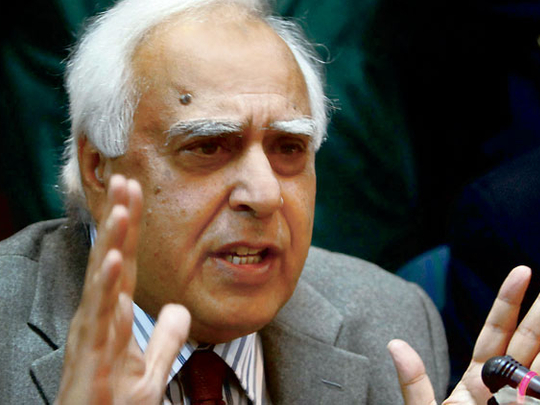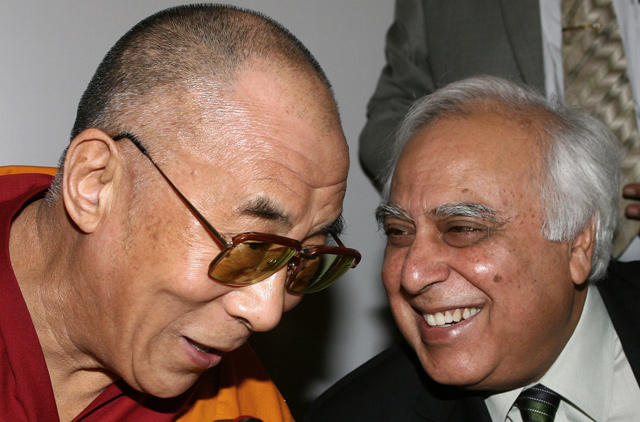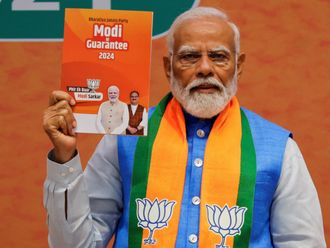
Federal Human Resource Development Minister Kapil Sibal has always been in the limelight. The lawyer-turned-politician is also a poet. As a lawyer, he was hired to deal with the cases of the high and the mighty, irrespective of the political party they belonged to. With skilful reasoning, he fought cases of Sanjay Dutt and Rajan Pillai and had been a consul to Jayalalitha, George Fernandes and Chandra Babu Naidu.
In a career spanning over 25 years, Sibal earned the reputation for defending the rights of the deprived and the under-privileged. He has to his credit many public interest litigations – representing the poor and issues related to bonded labour. His contribution towards environmental law litigations ranged from protecting the ecological balance of India’s coast line to saving the monument Taj Mahal from destruction at the hands of polluting industries.
Sibal's ideas are out-of-the-box. As a politician, he hit upon a novel concept to reconnect with voters during the 2009 Lok Sabha elections. He sent postcards asking them to write back to him with their list of problems and expectations in the Chandni Chowk constituency, which he represented. He says, "I got tremendous response and associated with people by way of talking to them on the phone or meeting personally".
Sibal won. And with education ministry under his wings, has been working on a slew of radical legislations through parliament. These include the Bill that makes the charging of capitation fee by institutes a ‘criminal offence’. Strict penalties have been stipulated for such offences with imprisonment for up to three years and fines ranging from Rs 5 lakh to Rs 50 lakh.
In a path-breaking move towards reforming India’s school education system, he has ‘detraumatized’ learning by doing away with the Class 10 Board examination and setting up an alternative evaluation system by replacing percentage with percentiles.
The Board exams are now optional for students who continue in the same school after Class 10. An internal assessment would be sufficient in these cases. Sibal's proposal for preparing the new education master plan was aimed at putting the children at ease, as students suicides have been reported increasingly. Terming the Indian education system, which is mark-centered and examination-based, as a source of trauma for both students and parents, he said, "Like everything else, it should be user-friendly and stress free."
In an exclusive interview to Gulf News, the minister fights his case coolly and educates about the on-going reforms.
GULF NEWS: Right to Education (RTE) came into effect on April 1. In what manner will it be beneficial for children?
KAPIL SIBAL: RTE has been a part of the directive principles of the State Policy under Article 45 of the Constitution, which is part of Chapter 4 of the Constitution. And rights in Chapter 4 are not enforceable. For the first time in the history of India we have made this right enforceable by putting it in Chapter 3 of the Constitution as Article 21. This entitles children to have the right to education enforced as a fundamental right.
What’s the route to quality education, wherein in the next decade the 60 million young graduates have ample job opportunities?
Education is not only about jobs. It’s also about becoming an enlightened citizen. Job is, of course, a part of it, because there’s no point educating somebody if it doesn’t have economic value. There are two objectives – one is the learning process to be a good citizen and the other the ability to use that knowledge for gainful employment.
Through the RTE, we have now changed the system of education by moving away from rote learning to a comprehensive continuous evaluation system without any Board examinations. But a constant evaluation of the inherent intelligence of the child, his ability to grasp concepts, ability to communicate and to interact with others. The learning process is not confined to text books, which are only the starting point. The learning really takes place beyond the classrooms. And as he moves up the education ladder into secondary and higher education, he decides on what discipline to take. And there we’ll give larger choices then what exist at the moment.
Today, the choices are science, commerce and humanities. We are going to add vocational certification in this. For example – an automobile engineer, graphic designer, animation expert or culture. These vocational trainings cater to employment opportunities. Students can then even move on to the vocational side into the polytechnics. But if they want to come back to academics we should give them the facility to do so.
Have you set any timeframe for this?
Yes. In terms of quality education, all teachers who are not qualified in terms of the qualifications prescribed under the Act, must acquire those qualifications in five years. And all infrastructure which is not consistent with the requirements under the Act, must be updated in three years. Teachers must teach 45 hours in a week, every school should have a play field and the people ratio has to be of 30 to 1. All these parameters, the national curriculum framework, will be devised and National Council of Education Research and Training (NCERT) will have a role to play in it. So it would be a core curriculum for everybody, which will apply across the board to all schools in India. Core curriculum is ready. It’s been adopted and hopefully by 2013 we are trying hard to hold a common entrance test for admission to engineering and medicine courses.
And of course, the disadvantaged children and children with special needs will have special assistance. Twenty-five per cent of children with special needs will have to be admitted in Class 1 of every private school. So that in 12 years it’s 25 per cent throughout the school.
How’s been the feedback to optional Board exams for Class 10? Does the same apply to schools abroad that follow the CBSE curriculum?
The response has been very good, though initially there was a problem, as people didn’t understand what comprehensive and continuous evaluation meant. It’s very exciting for the children, who are enjoying it much more than the faculty, because there’s much greater responsibility on the teachers now. The teacher has to assess each individual student and determine the child’s qualities and aptitudes, beyond text book learning. And this is far more complex than having a child sit for an exam based on a chapter in a text book.
Are there any special benefits that students in and around UAE will get from the whole lot of changes your ministry is set out to make?
The benefits are for all CBSE affiliated schools. In fact, the UAE is now launching CBSE-International, in Class 1 and Class 9. We are setting up a whole new system where CBSE will offer an international de course. Very recently, I had a meeting with 27 principals of schools from Dubai, Qatar, Muscat, the Gulf and Singapore, who are starting the system from this year. So CBSE-I will be a global brand in the years to come.
The Indian government has been opening Indian schools in Islamic countries. Is it a well-thought out agenda of the Congress to woo the Muslim community?
There is no such thing. If you want to be a global brand in education, you have to think in those terms. There are lots of Indians all over the world wanting an education of international flavour. Our Board will be far more competitive to the International Baccalaureate (IB). And therefore, we will be able to access much larger numbers than IB.
You had urged the boards to ensure fluency of 3 languages – English, Hindi and regional mother tongue. What’s the status?
The point I was making was that all three languages are exceptionally important. Your mother tongue is in which you are taught and brought up, English connects you to the world and Hindi connects you to the rest of India. Now how this is spread out and in what manner, the states have to decide.
The government’s nod to allow foreign universities to open campuses in India is drawing flak from educationists. They say universities won’t become Oxford if they set up in India.
The universities that are going to be set up at all in India should have an Indian eco-system. Why should we want an Oxford here? We don’t get children from Eaton and Harrow. But yes, the quality of an Oxford is required in terms of research - of academics, knowledge generation and syllabi flexibility. So we should build institutions which are equivalent to those outside the country. And allow quality to come into the country, because there’s a huge gap between supply and demand. And since demand is going to increase exponentially, because India has a young population, we need to increase the institution of the supply. And all stakeholders – industry, private sector, foreign universities and public partnership should have a chance to participate in the system.
Foreign universities are collaborating for research, but are hesitant to set up campuses in India because the Indian government regulations restrict aspects of administration including fees, salary and research grant.
On the contrary, there are no regulations today, because we don’t have a law. We want to regulate these to ensure that quality institutions come in. They should have the freedom that they are entitled to under the national laws because we are changing the structure of our laws. They will have to go through an accreditation process and can teach what they want, in the manner they want and there will be no interference in those processes.
Educationists are criticizing the entry of international institutes saying they will only target the elite.
Why would that happen? There’s lot of space available to foreign education providers. In skill development it could be para medics, lab assistant, para legals, automobile engineers, financial services, floor managers in the retail sector, tourism and hospitality – and the elite won’t go to these fields. There will be an enormous workforce that will be required as the country’s economy expands. The foreign education providers will allow investments in vocational training and certification courses. As for the universities, the collaboration that takes place will be with Indian Institute of Technology (IITs). Now if the IITs are for the elite, we should close these down also. If foreign education providers collaborate with them, then it becomes elite, but on their own, they are fine. This attitude is not correct. If those who have to pay 60,000 to 80,000 dollars by going abroad get the same education by paying 20,000 dollars, are we catering to the elite? We are, in fact, reversing the process by saying that India should become a hub of education. And institutions should come here because there are economics of scale to be had, which will be a win-win for everyone.
Do you foresee decline in number of students going abroad for higher education after taking loans? Will the fee structure here be less compared to foreign universities?
Once the quality of institutions is set-up it will happen. That’s why we want to reduce that by bringing in more competition into the system, increase the supply so that fees comes down.
It’s feared that poorly paid in the universities, teachers will be drawn to foreign universities. The government should rather focus on injecting more funds into the university systems.
If the academics were so poorly paid, then all the IITs should have gone to the private sector in the last 60 years. There are lots of private institutions in India, including 90 per cent of all engineering institutions. Many of them must want to pay more to the IIT professors. So why have they not left?
One of the big problems in India is that the faculty in this country is not of the standard, which is why the quality of education imparted is not of standard. We need to improve that quality of faculty. The ISB has been in India for long, but they have never hired the Indian faculty. The experience of foreign universities in other countries is not that they change exorbitant fees or they take away the faculty. The ultimate analysis should be that the children to be educated will be Indians.
Once a foreign university opens a campus in India will it be ensured that the degree/diploma it provides here has the same value internationally?
It has to have a value. I can’t say internationally. Everything will depend on the quality of the institutions. ISB is in the first 20 schools of the world. They don’t grant a degree, but they are there.
While some educationists say we have first rate institutions like IITs, others say IITs are still not the best.
IITs are engineering institutions. For an institution to be regarded in top categories you need multiplicity of disciplines. Most that are in the top in the world are not stand-alone engineering institutions. One can’t expect an Indian university, when it didn’t even have the wherewithal, to become one of the best in a short span of time. Other universities have taken more than 200 years to reach where they are. So, we cannot be expected to reach there in five years.
Could you cite a couple of reasons why foreign education providers would be willing to invest in education in India?
Very simple. It’s a good economic model. Why did people come to India to outsource services? They didn’t come to do charity. They want to be competitive in the world. And in order to do that they have to access low cost services of very high quality. Why did they go to China for outsourcing of manufacturing? It wasn’t to be generous to that country, but because they wanted to be competitive. Similarly, in the education sector, the human resource is going to be provided to the global community either by India or by China. In a global community where many regions have a demographic deficit, that is going to be filled up by the demographic dividend in India. And if that workforce is not empowered through skill development, it won’t be available to the West. And per dollar investment in India has a far greater return then investing in an institution outside of India in the developed world.
You’ve urged Indian industrialists to invest in education. How’s the response?
Very good. Once the new laws are set in motion, we will have enormous investment in education by private entrepreneurs.
Have you set any percentage in mind in wanting lending rates for loans to private players in education to be reduced and given tax breaks?
This policy has to evolve. Presently, education is regarded as a charity. And yet when you plan to set up an educational institution and go to a bank, the loan you get is at commercial rates, whereas building a road is not a charity. It gets priority lending rates. We want to set that right. In the times to come, we hope that education institutions will be entitled to borrowing money from the banks at priority lending rates and will have long term gestation periods for the purpose of paying back.
Although private schools are given land at subsidized rates, they do not provide education to children from economically backward class.
Many of them are unaided institutions. And they believe that the government should not interfere. And someone has challenged this also in the Supreme Court. So it’s under litigation. But we believe that imparting education should be part of the corporate social responsibility.
Your views on online schooling.
Online schooling is not the best method of teaching, but it can fill in the gap if you don’t have the faculty. The sources of knowledge now are beyond the teacher, so online schooling is also possible, where the content is better. Some schools can adopt it, but I don’t think as a general proposition, on-line schooling will happen in India, because we don’t have broadband facilities. And till such time it’s a distant dream on a large scale.
What’s been the outcome of your interactions on educational reforms with state education ministers?
They’ve been very supportive and all the resolutions were passed with unanimity. There was no dissent, except 1-2 states which are quite vociferous because they have an ideology of their own. But that’s to be expected in a democracy. We go by the majority and public opinion and the public is on our side.
How tough has been the route to break the bureaucratic hurdles?
Not easy. But not very tough either. I have found the bureaucrats collaborating and cooperating with me in a big way, though it took a bit of time to change the mindset and the direction.
Do you have any fears in mind that things might not turn as rosy as they seem?
There is no fear. I am trying to do things with passion, conviction and integrity.
Profile
• Kapil Sibal was born on August 8, 1948 in Jalandhar, Punjab to Kailash Rani and Hira Lal Sibal, a leading lawyer from Haryana.
• Educated at St Stephen’s College, University of Delhi – 1967.
• Post graduation in History – 1969.
• Joined law college and at the same time became a teacher in Hindu College.
• Qualified for the Indian Administrative Services – 1973.
• Went to the US and did Masters from the Harvard Law School and between 1977-1980 practiced as an associate in the law firm at Cole and Deitz at New York.
• Additional Solicitor General of India – 1989-1990.
• President, Supreme Court Bar Association – 1995-96, 1997-98 and 2001-02.
• Congress party member, Rajya Sabha – 1998-2004.
• Elected to the Lok Sabha – 2004.
• Federal Cabinet Minister, Science & Technology and Earth Sciences – 2004-09.
• Led the first Indian expedition to the Arctic and was responsible for setting up an Indian Reserch Station – 2008.
• First Indian minister to travel to the icy continent of Antartica and stayed there in sub-zero temperatures.
• Minister of Human Resource Development – 2009.
In brief
• India has one of the largest numbers of higher education institutions in the world comprising at least 490 universities and 20,769 colleges.
• But the quality is low and many graduate skills are so poor they are unemployable.
• More than 160,000 students leave Indian shores annually to study at universities abroad.
• Educational institutions have made a foray into India, but their involvement has been limited.
• There are at least 100 foreign educational institutions offering programmes in the country, but most are vocational or technical.
• The Cabinet recently approved a Bill that seeks to allow foreign university campuses in India. The Bill is to be tabled in Parliament this month.
• The move will open a huge market but foreign universities will have to adhere to some guidelines.
• Foreign institutes will need to deposit Rs.50 crores as corpus fund.
• Each institute will have to be registered with the University Grants Commission or any regulatory body.
• The government will have the right to reject application of any foreign university on grounds of ‘national security’.
• Foreign institutes will not be able to take the profits back. They will be liable to spend it on further expansion.
• No ‘quota’ law will be applicable to foreign universities setting up campuses in India.
• Institutes will have to submit details of fees charged, syllabi and teachers salaries to the regulator.













